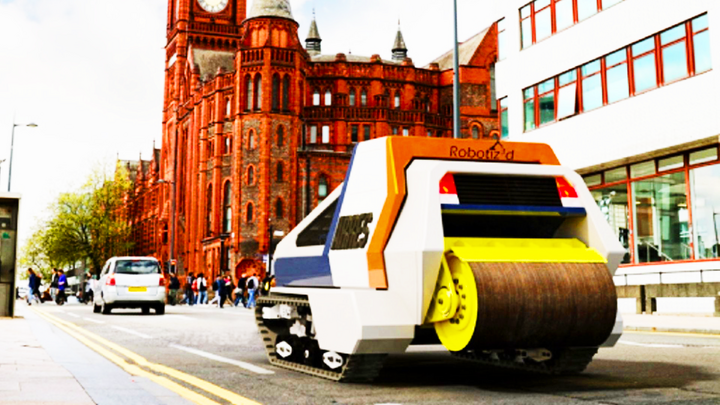In a significant advancement for road maintenance, the world’s first autonomous pothole-busting robot is ready for its first road trial in Hertfordshire, UK. Built by tech company Robotiz3d and academics from the University of Liverpool, the autonomous product is the first to venture outside the confines of a lab.

ARRES Prevent, an advanced AI-powered robot that can detect and fill cracks and potholes on roads automatically. (Photo: Robotiz3d Ltd)
Called the Termed Autonomous Road Repair System Prevent, or ARRES Prevent for short, this advanced robot is equipped with Artificial Intelligence (AI) technology to detect and analyze cracks and potholes on the road. Once identified, the device will automatically fill those cracks and potholes on the road.
The innovative technology promises to save significant time and money, while minimising disruption for road users on UK motorways.
According to the team, the development of ARRES Prevent heralds a potential new revolution in road infrastructure maintenance. This pioneering technology could also help redefine how the UK and global community proactively address road infrastructure challenges in the near future.
The robot idea started as a research project at the University of Liverpool in 2016. Four years later, university researchers founded technology company Robotiz3d Ltd with a mission to advance innovative road maintenance technology.
In 2023, the company developed ARESS Eye, a system that analyzes and surveys road surface conditions without human intervention.
The device can collect data while traveling at speeds of up to 60 mph, and the road maintenance vehicle scans each lane with a field of view of up to 10 feet. ARESS Eye also provides detailed depth information and volumetric data, ensuring a comprehensive analysis of road defects.
As an extension of the ARESS Eye system, the new complete ARRES Prevent robot operates autonomously or via remote control, it can patrol the road to identify and seal cracks and fill potholes.
Technically, the ARRES Prevent is essentially a battery-powered vehicle, similar to a minivan, that offers flexibility and efficiency in road maintenance, by seamlessly recording repair details and locations to implement strict quality control measures. The ARRES Prevent system can also operate day or night, unaffected by light conditions, ensuring uninterrupted service.
Potholes pose a significant challenge for UK drivers, leading to vehicle damage and significant costs. Technology company Robotiz3d estimates that pothole-related costs to UK drivers total $2.2 billion annually.
Despite efforts to fix nearly two million potholes each year, new potholes continue to appear every day, overwhelming conventional manual repair methods.
Robotiz3d claims that their new technology can significantly reduce costs by 90% compared to traditional road maintenance methods and increase processing speed by 70%. The use of automated technology significantly speeds up repair times, surpassing manual methods. Furthermore, this method produces three times less CO2 emissions than similar processing technologies.
HUYNH DUNG (Source: Interestingengineering)
Source





![[Photo] More than 17,000 candidates participate in the 2025 SPT Competency Assessment Test of Hanoi National University of Education](https://vphoto.vietnam.vn/thumb/1200x675/vietnam/resource/IMAGE/2025/5/17/e538d9a1636c407cbb211b314e6303fd)
![[Photo] National conference to disseminate and implement Resolution No. 66-NQ/TW and Resolution No. 68-NQ/TW of the Politburo](https://vphoto.vietnam.vn/thumb/1200x675/vietnam/resource/IMAGE/2025/5/18/adf666b9303a4213998b395b05234b6a)
![[Photo] General Secretary To Lam visits exhibition of achievements in private economic development](https://vphoto.vietnam.vn/thumb/1200x675/vietnam/resource/IMAGE/2025/5/18/1809dc545f214a86911fe2d2d0fde2e8)





























![[Photo] Prime Minister Pham Minh Chinh chairs meeting on science and technology development](https://vphoto.vietnam.vn/thumb/1200x675/vietnam/resource/IMAGE/2025/5/17/ae80dd74c384439789b12013c738a045)































































Comment (0)